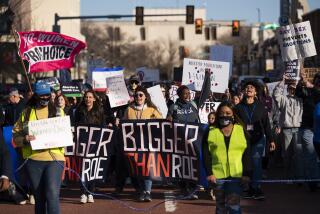The Abortion Review
- Share via
At today’s traditional Friday meeting, the nine U.S. Supreme Court justices will take a preliminary vote on their newest abortion case. Whatever the justices decide and whatever court opinion they fashion in the coming weeks will not end the debate over abortion. The decision will, however, clarify what legal battles, if any, remain to be fought, and where.
The justices’ questions during oral argument Wednesday revealed the issues that are likely to sway the swing votes. Justices Sandra Day O’Connor and Anthony M. Kennedy both probed the validity of state intervention in procreation. In dialogue with Charles Fried, the former U.S. solicitor general who was arguing the government’s anti-abortion case, O’Connor asked pointedly, “Do you say there is no fundamental right to decide whether to have a child or not? Do you deny the Constitution protects that right?”
In his turn, Kennedy referred to a 1965 Connecticut case that legalized the sale of contraceptives. To him, the fundamental right of privacy enunciated in that case appeared similar to that on which turns the 1973 ruling that legalized abortion. Fried argued that the 1965 ruling was right and the 1973 application was wrong. Logic dictates against that view, and Kennedy’s line of questioning was a hopeful sign for those who favor keeping the law that now allows a woman to choose to terminate a pregnancy by abortion.
The state of Missouri was asking the court to reinstate its law that prohibits public hospitals or public employees from performing abortions unless necessary to save a woman’s life, prevents use of tax money for programs that involve abortion counseling and requires tests to ensure that a fetus older than 19 weeks would not be viable outside the womb. The law, held unconstitutional by a federal appeals court, also declares that life begins at conception.
Any provision of that law, once upheld, would become a punitive weapon to be used against women, not only in Missouri but wherever anti-abortion forces could duplicate it in other state legislatures. The high court can thus stop short of heeding the government’s request to overturn completely Roe vs. Wade, the 1973 case that legalized abortion, but still harm women.
By banning any public conduct or financing of abortions, the law especially strikes at the poorest women. If existing law is substantially changed, the more affluent would still be able to seek qualified private doctors or travel to states whose laws were less hostile to abortion. The poor would either bear unwanted children or take their chances with back-alley quacks.
Ours is a government of the people. A substantial number of those people do not want legislators or judges in far-off cities dictating their most personal of decisions, that is, whether to complete or end a pregnancy. They do not want to decide what choices others make; they want simply for government to leave them alone to make their own choices, choices that can never be lightly made.
More to Read
Get the L.A. Times Politics newsletter
Deeply reported insights into legislation, politics and policy from Sacramento, Washington and beyond. In your inbox twice per week.
You may occasionally receive promotional content from the Los Angeles Times.










